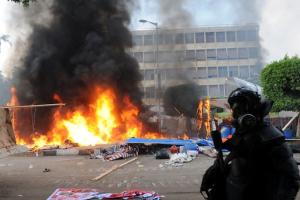Egypt in Year Three
The Nation
 Since the military ouster of elected president Mohamed Morsi last July, followed by the brutal crackdown against the Muslim Brotherhood, the security establishment has emerged re-empowered, reinvigorated and out for revenge, cracking down on its opponents with unprecedented severity. Much of Egypt is awash in conformist state worship, fueled by the shrill narrative of a war on terror and the age-old autocratic logic that trades rights for the promise of security.
Since the military ouster of elected president Mohamed Morsi last July, followed by the brutal crackdown against the Muslim Brotherhood, the security establishment has emerged re-empowered, reinvigorated and out for revenge, cracking down on its opponents with unprecedented severity. Much of Egypt is awash in conformist state worship, fueled by the shrill narrative of a war on terror and the age-old autocratic logic that trades rights for the promise of security.









Spread the word